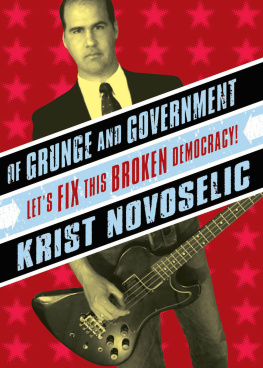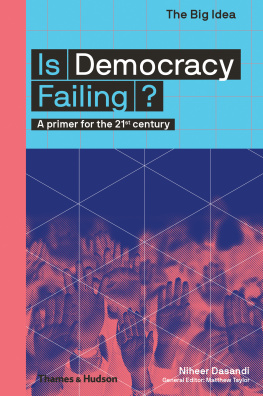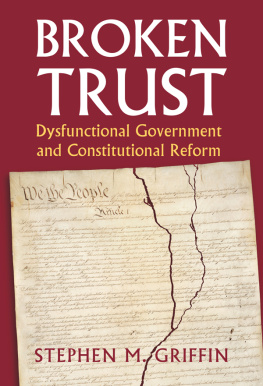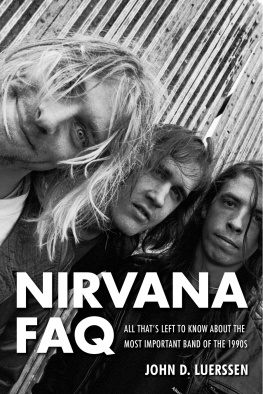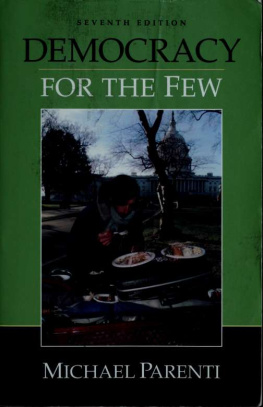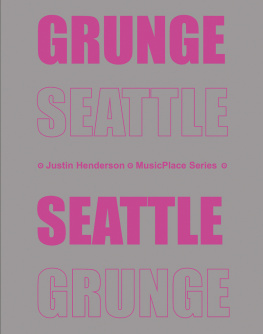Chapter 1: Music Must Change
Society offers many labels for people who run against the grain. But its the people on the so-called fringes who actually bring change. Without rebels, rabble-rousers, malcontents, or whatever label we choose to apply, the culture would remain static.
Look around the world at cultures that squash expressiontheir resistance to change has left them stuck in the 19th century. And while many in our nation disparage those who diverge from the status quo, its people who made their own way that created the United States. Our founders refused a monarchy whose power was derived from heredity. The notion of a republic of the people, by the people, and for the people shattered the old paradigm. The new republic, the United States of America, acknowledged freedom as a basic tenet of human experience.
Independence in the U.S. guarantees individuals the right to speak. But independence must also speak to us.
It was in 1983 that I walked into a bookstore in Seattles University District asking for anything by Jack Kerouac. The clerk, with a broad grin, walked over to a shelf and handed me The Dharma Bums. Reading Kerouac confirmed the sense of independence I have always felt. The Dharma Bums is about the journey of life and meaningful connection with people. The story culminates in the classic journey to the mountain, where the protagonist, Japhy, ends up in a fire lookout tower in Washington State. A Zen hermit experience is conveyed in quintessential beat prose; there, alone, he transcends time and self in an exploration of inner-space. Every moment is savored, every simple action a meaningful experience. Its as if he is living his last days on earth. In his subsequent work, Kerouac left the isolation of the mountain to return to society. His world was not confined to the tailfins and poodle-skirts of 1950s popular culture. He lived in the subterranean realm of the beat generation. Subcultures are where many people who are not inclined to adhere to conformity connect with others of the same ilk. Independence is not isolation.
I grew up in Aberdeen, Washington in the early 1980s and had a lot of fun there. But eventually I began to grow away from the party crowd that made up my social life. In the mid-1960s, smoking marijuana was a political statement, the countercultures answer to the mainstream martini crowd. But by the time it hit my scene, pot was a clich icon, something fundamental to the identity of people referred to as stoners. There is a certain camaraderie that manifests itself in the course of passing a joint around; unlike sharing a beer, the illegal act of smoking pot demonstrates actual humanity in the face of abstract prohibitions. But to many stoners, marijuana was more about escapism than real liberation. If anything, drop out was the only relevant term left of Timothy Learys famous axiom, Turn on, tune in, drop out. The stoner message was: Dont expect anything from me. It was antiestablishment, and petty resistance was sometimes acted out in the world of traffic court, with stoners (like many others) subject to a seemingly endless cycle of DUI and wrong-turn tickets and fines paid on installment. Stoners were in a lower economic strata, locked in a punitive relationship with their government based on issues regarding the secondary task of transportation. It was token rebellion against the forces that threatened a Saturday night party. Stoner was a counterculture without a mission.
As far as the music of that scene went, the slick, canned sounds of mainstream heavy metal didnt appeal to me. In 1980, I lived in what was then Yugoslavia for a year. A lot of music came down from London; I heard punk rock and caught much of the ska scene of the time. Yugoslavia also had a homegrown scene with good, diverse music. But when I returned to the U.S., I found that it was hard for punk to make its way to Aberdeen because of its geographic isolation. Still, it trickled in the best it could. I watched New Wave Theatre on the U.S.A. Network or heard punk on Sunday night specialty shows on FM radio stations. Gradually, here and there, I picked up on a style of music I knew was controversial. It eventually gained a foothold, thanks to the efforts of some truly independent young minds.
I met Buzz Osborne and Matt Lukin while working after school in a fast-food restaurant. These fellows were in an actual punk band, the Melvins! And Buzz was not only up on the music, he also had an excellent grasp of the whole ethic of punk subculture. I needed a breath of fresh air and was immediately intrigued. These new sounds were raw and vital. I started buying the music emanating from underground scenes in San Francisco, Los Angeles, Washington, D.C., and other places. Punks were also connected through do-it-yourself (DIY) publishing. Fanzines were the blogs of the early 80s. Anything went with the zines; they not only covered music, there was a heavy dose of politics as well. Of course they were antiestablishment, and most were left-wing, promoting vegetarianism, drug-free living, and anticorporatism. They were truly independent and decentralized, in stark contrast to the mainstream media I was used to. They were part of an alternative economy promoting small, independent business. For me, punk wasnt a fad; it offered meaning in a society that didnt offer enough.
Punk rejected the mainstreamwhich was just as well, because the mainstream rejected punk. Safety pins through the nose, loud clothing, and spiked hair scared most people. Too many associated self-destructive violence with punk. Punk was supposed to annoy and antagonize society, and indeed it did. In the early 80s, punk rockers were despised and ridiculed by their peers in the stoner crowd; the spiked growl of punk upset the soft feathers of Camaro hairstyles. One time, while standing in front of a club with some friends, we got hit by eggs tossed out of a passing muscle car. Laughing, we wiped away the egg on our tattered flannel with the same hands we used to wash away societys conformity. Self-assured in our personal liberation, ridicule from conformists couldnt upset true punks.
I started shopping for clothes at the Salvation Army in an attempt to subvert consumerism (I had little money anyway). In 1983, cool clothing from the 50s and 60s really wasnt that old; this was right before the vintage/collectable industry started scooping things up. As a badge of my independence, I dressed differently from the status quo, and, unlike some punks, I didnt dress dangerously. I didnt have a mohawk or a studded leather jacket. I didnt throw away my Aerosmith or Led Zeppelin records either. Id hear punks refuting the old guardthey cast 70s rock bands away as though they were false prophets; those who followed old-school rock ran the risk of being taunted by these self-appointed guardians of the new order. This was simply pop music turning through its cycle of reinvention, but with a big dose of ideology mixed in. Some fanzines were very dogmatic, demanding a purity of ethic. Even though I was a believer in punk, how could I reject the music that gave me so much joy? Where would the world be without Black Sabbath? If punk was about freedom, why conform to some kind of molded identity? If I wanted to wear a uniform, Id join the military. I believe that punk is a state of mind. Its about making your own way. And regardless of orthodoxy, I felt punk was messianic. In a lot of ways it did save me. An alternative vision didnt have to be stuck in the hippy 1960sit was reborn through punk! A new generation was offered the promise of liberation from the status quo. And we were given community to boot.
In 1984 I traveled with Buzz and Matt to Walla Walla, Washington to see Black Flag perform. We drove across the state in a 1968 VW van painted like a zebra. Black Flag was on a mission to bring punk to the hinterlands, going out of their way to play small towns off the beaten path. Lead singer Henry Rollins sang of alienation with lyrics like,


